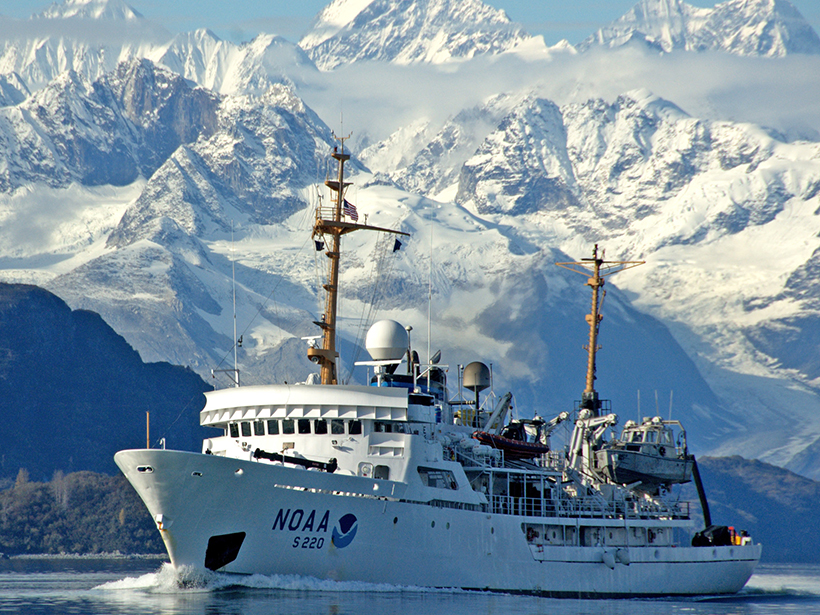Barry Lee Myers, the White House’s choice to head the National Oceanic and Atmospheric Administration (NOAA), predictably squeaked through a Senate committee vote along party lines, 14–12, on 3 April. However, approval of the long-delayed controversial nominee by the full Senate is not a sure bet and could face a floor fight, one Democratic senator told Eos.
Some supporters of the nominee point to Myers’s background as the former chief executive officer of AccuWeather as beneficial for understanding weather-related issues. AccuWeather, headquartered in State College, Pa., bills itself as the world’s largest and fastest-growing weather company. When Myers was initially nominated in October 2017, the White House called him “one of the world’s leading authorities on the use of weather information.”
In addition, Myers has been a special adviser to three directors of NOAA’s National Weather Service (NWS) and also has served on a NOAA Science Advisory Board working group.
However, critics charge that Myers’s nomination raises a number of problems, including red flags for potential conflicts of interest. Although Myers stepped down as AccuWeather CEO in January and sold all his interests in the company and its subsidiaries and related companies, Myers’s brother, Joel, remains as AccuWeather president and chairman.
Other criticism of Myers focuses on AccuWeather’s past support to privatize weather data and on Myers’s lack of a science background. Also, AccuWeather reached a conciliation agreement with the U.S. Department of Labor in June 2018 after the department found that the company “discriminated against female employees by subjecting them to sexual harassment and a hostile work environment.”
Democratic Opposition
“Barry Myers, the nominee to lead NOAA, has been steadfastly and publicly committed to dismantling the agency he was supposed to lead. That, in my mind, represents a challenge and a conflict,” Sen. Maria Cantwell (D-Wash.), said prior to the 3 April vote by the Senate Committee on Commerce, Science, and Transportation. Cantwell is the ranking Democrat on the committee, which met in executive session to vote on Myers and other White House nominees and to advance various pieces of legislation.
“Barry Myers’s conflicts of interest are too great for him be the head of the NOAA and the National Weather Service.”
Sen. Richard Blumenthal (D-Conn.) told Eos that “there may very well be a fight on the [Senate] floor” over Myers and other nominees the committee voted on.
Myers “is way too close to the industry [and] has personal ties to it,” said Blumenthal, a member of the Senate committee. He added that a revolving door and financial and other ties to industry raise “the prospect of corruption and crisis of confidence on the part of the American public.”
Another committee member, Sen. Ed Markey (D-Mass.), told Eos that he opposes the nominee because “Barry Myers’s conflicts of interest are too great for him be the head of the NOAA and the National Weather Service.”
Surprised by the Fuss over the Nomination
Committee chair Roger Wicker (R-Miss.) expressed confidence in Myers.
“I’m a bit nonplussed by my colleagues on the other side of the aisle choosing to make such a case about this one individual. I think he’ll do a fine job.”
“I am really surprised that this nomination has become somewhat of a cause célèbre,” Wicker told Eos. “I think the information that we have received was that he’s cut all of his previous ties [to AccuWeather] and that he has been very forthcoming.”
Wicker continued, “As you know, this is the second year that this matter has been before us, and so I’m a bit nonplussed by my colleagues on the other side of the aisle choosing to make such a case about this one individual. I think he’ll do a fine job.”
Wicker added that he believes Myers will follow the law. “I don’t see a conflict with Myers in terms of AccuWeather,” Wicker said.
Questioning Whether Myers Is the Leader NOAA Should Have
Several outside groups also criticized Myers’s nomination. “Barry Myers is unqualified, he has serious ethical conflicts, and he is not an appropriate person to lead one of the nation’s premier science agencies,” said Miriam Goldstein, director of ocean policy for the Center for American Progress, a nonpartisan policy institute based in Washington, D.C.
“It’s important to have a Senate-confirmed leader” of NOAA, Goldstein told Eos. “But Barry Myers is not the one that NOAA should have.”
William Hopkins, executive vice president of the National Weather Service Employees Organization, said that he worries about the potential negative impact Myers might have on the agency if he is confirmed by the Senate.
AccuWeather “had been lobbying Congress for years to try and take away some of the products that [NWS] produces,” Hopkins told Eos. The labor organization and professional association represents about 4,000 NOAA employees. “Now his brother’s company will have an advantage to what some of our ideas are and ways that we are looking to develop new products to protect the lives and the public.”
That potential direct advantage “doesn’t seem to bother the [Trump] administration,” he added.
—Randy Showstack (@RandyShowstack), Staff Writer
Citation:
Showstack, R. (2019), Senate committee OK’s White House’s NOAA pick in party line vote, Eos, 100, https://doi.org/10.1029/2019EO120075. Published on 04 April 2019.
Text © 2019. AGU. CC BY-NC-ND 3.0
Except where otherwise noted, images are subject to copyright. Any reuse without express permission from the copyright owner is prohibited.

